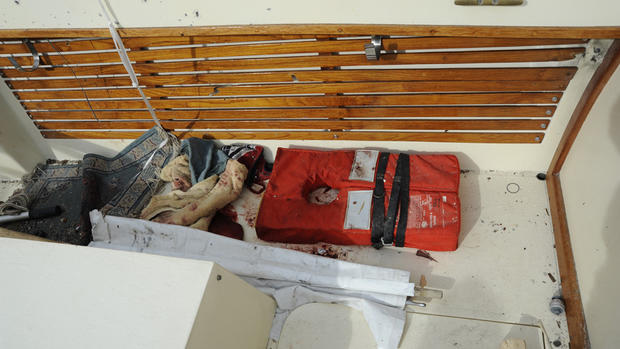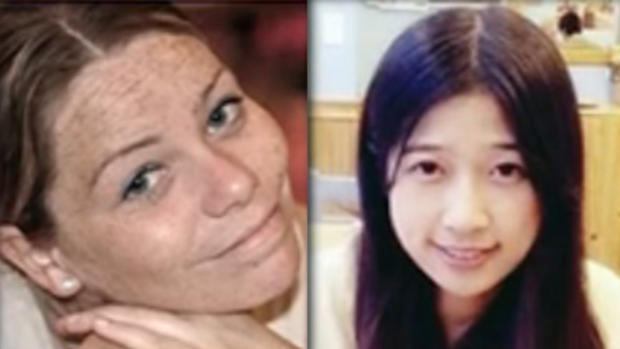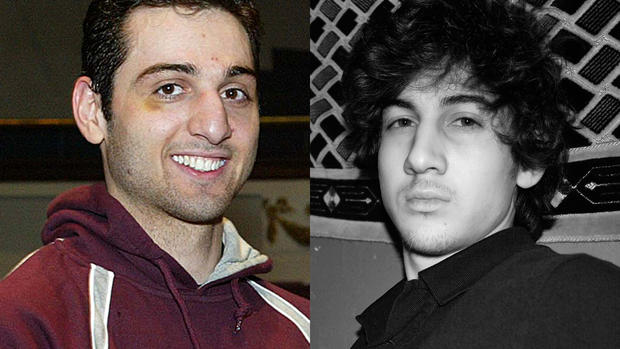Tsarnaev convicted on all charges in Boston Marathon bombing
BOSTON -- Dzhokhar Tsarnaev was convicted on all charges Wednesday in the Boston Marathon bombing by a federal jury that now must decide whether the 21-year-old former college student should be executed.
Tsarnaev folded his arms, fidgeted and looked down at the defense table as he listened to one guilty verdict after another on all 30 counts against him, including conspiracy and deadly use of a weapon of mass destruction. Seventeen of those counts are punishable by death.
CBS News' Nicole Sanseverino reports from the courtroom that many of the jurors watched Tsarnaev as the the verdict was read. One juror looked at Tsarnaev with a firm face as the first half of the counts were read.
The verdict - reached after a day and a half of deliberations - was practically a foregone conclusion, given his lawyer's startling admission at the trial's outset that Tsarnaev carried out the terror attack with his now-dead older brother, Tamerlan.
"Today's verdict will never replace the lives that were lost and so dramatically changed, but it is a relief, and one step closer to closure," victim Jeff Bauman said in a statement on Facebook. Bauman lost both legs in the first of the two explosions on Boylston Street.
Heather Abbott, who lost her left leg below the knee in the bombings, thanked supporters of the victims in a Facebook post.
"Nothing can ever replace the lives that were lost or changed forever, but at least there is some relief in knowing that justice is served and responsibility will be taken," Abbott wrote.
The two shrapnel-packed pressure-cooker bombs that exploded near the finish line on April 15, 2013, killed three spectators and wounded more than 260 other people, turning the traditionally celebratory home stretch of the world-famous race into a scene of carnage and putting the city on edge for days.
Tsarnaev was found responsible not only for those deaths but for the killing of a Massachusetts Institute of Technology police officer who was gunned down days later.
"Guilty like we all knew he would be. Great jurors," said Sydney Corcoran, who nearly bled to death after shrapnel severed a major artery.
Karen Brassard, who suffered wounds on her legs, said: "It's not a happy occasion, but it's something. ... One more step behind us."
She said Tsarnaev appeared "arrogant" and uninterested during the trial, and she wasn't surprised when she saw no remorse on his face as the verdicts were read.
Brassard refused to say whether she believes he deserves the death penalty, but she rejected the defense argument that he was simply following his brother's lead.
"He was in college. He was a grown man who knew what the consequences would be," Brassard said. "I believe he was 'all in' with the brother."
Tsarnaev's lawyers left the courthouse without commenting.
In the trial's next phase, which could begin as early as Monday, the jury will hear evidence on whether Tsarnaev should get the death penalty or spend the rest of his life in prison.
In a bid to save him from a death sentence, defense attorney Judy Clarke has argued that Tsarnaev, then 19, fell under the influence of his radicalized brother.
"If not for Tamerlan, it would not have happened," Clarke told the jury during closing arguments.
Prosecutors, however, portrayed the brothers - ethnic Chechens who moved to the United States from Russia more than a decade ago - as full partners in a coldblooded plan to punish the U.S. for its wars in Muslim countries. Jihadist writings, lectures and videos were found on both their computers, though the defense argued that Tamerlan downloaded the material and sent it to his brother.
Tamerlan, 26, died when he was shot by police and run over by his brother during a chaotic getaway attempt days after the bombing.
The government called 92 witnesses over 15 days, painting a hellish scene of torn-off limbs, blood-spattered pavement, ghastly screams and the smell of sulfur and burned hair.
Survivors gave heartbreaking testimony about losing legs in the blasts or watching people die. The father of 8-year-old Martin Richard described making the agonizing decision to leave his mortally wounded son so he could get help for their 6-year-old daughter, whose leg had been blown off.
In the courtroom Wednesday, Denise Richard, the boy's mother, wiped tears from her face after the verdict. The boy's father, Bill Richard, embraced one of the prosecutors.
In Russia, Tsarnaev's father, Anzor Tsarnaev, told The Associated Press in recent days that he would have no comment.
The others killed in the bombing were Lingzi Lu, a 23-year-old Chinese graduate student at Boston University, and Krystle Campbell, a 29-year-old restaurant manager. MIT Officer Sean Collier was shot to death at close range days later.
In a statement, Collier's family welcomed the verdict and added: "The strength and bond that everyone has shown during these last two years proves that if these terrorists thought that they would somehow strike fear in the hearts of people, they monumentally failed."
Some of the most damning evidence included video showing Tsarnaev planting a backpack containing one of the bombs near where the 8-year-old was standing, and incriminating statements scrawled inside the dry-docked boat where a wounded and bleeding Tsarnaev was captured days after the tragedy.
"Stop killing our innocent people and we will stop," he wrote.
Tsarnaev's lawyers barely cross-examined the government's witnesses and called just four people to the stand over less than two days, all in an effort to portray the older brother as the guiding force in the plot.
According to defense testimony, phone records showed Dzhokhar was at the University of Massachusetts-Dartmouth while his brother was buying bomb components, including pressure cookers and BBs.
Tamerlan's computer showed search terms such as "detonator" and "transmitter and receiver," while Dzhokhar was largely spending time on Facebook and other social media sites. And Tamerlan's fingerprints, but not Dzhokhar's, were found on pieces of the two bombs.
Clarke is one of the nation's foremost death-penalty specialists and has kept other high-profile defendants off death row. She saved the lives of Unabomber Ted Kaczynski and Susan Smith, the South Carolina woman who drowned her two children in a lake in 1994.
Tsarnaev's lawyers tried repeatedly to get the trial moved out of Boston because of the heavy publicity and the widespread trauma. But opposition to capital punishment is strong in Massachusetts, which abolished its state death penalty in 1984, and some polls have suggested a majority of Bostonians do not want to see Tsarnaev sentenced to die.
During the penalty phase, Tsarnaev's lawyers will present so-called mitigating evidence they hope will save his life. That could include evidence about his family, his relationship with his brother, and his childhood in the former Soviet republic of Kyrgyzstan and later in the volatile Dagestan region of Russia.
Prosecutors will present so-called aggravating factors in support of the death penalty, including the killing of a child and the targeting of the marathon because of the potential for maximum bloodshed.


